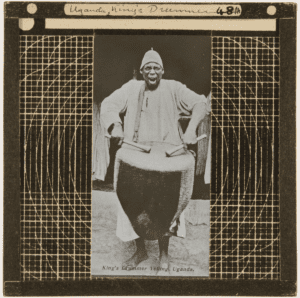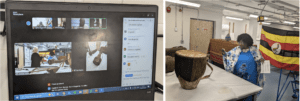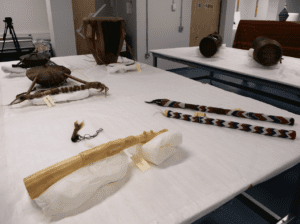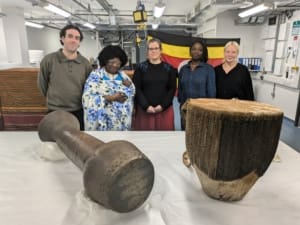Rethinking Relationships: Reviving Ugandan Musical Heritage in the Museum Context
Tom Fearon | Relationship Manager, Rethinking Relationships, Pitt Rivers Museum, University of Oxford | 6th December 2024.
When museums represent cultures, they often frame things within opposing categories like ‘us vs. them’ or ‘past vs. present’. The ethnographic museum is often tasked with the challenge of communicating what makes us all similarly human as much as what makes us unique, an endeavour which works through dualities. Objects and collections hold both historical significance and contemporary relevance, yet the colonial legacies that shape these collections complicates how we engage with them today.

The Rethinking Relationships project seeks to address this by creating collaborative dialogues between communities and museums. Working with partners in the UK and across Africa, the project invites our partners to reshape how their histories and cultures are represented in museum spaces. One of the project’s initiatives has focused on Ugandan collections, particularly at the Museum of Archaeology and Anthropology (MAA) in Cambridge. This collaboration explores how Ugandans today relate to objects that were often collected under colonial circumstances, and how those objects might better reflect contemporary Ugandan identities.
The project began with a discussion of the Royal Bunyoro-Kitara collections at the Pitt Rivers Museum, where two passionate women from the Bunyoro community—Daisy Byaruhanga and Jane Francis Gaffa—were key collaborators. As Banyoro women, they have long been invested in reviving the historical traditions and material culture of their kingdom. Their research into collections like a Bunyoro Royal Throne, which was acquired by colonial missionary John Roscoe, exemplifies the need to explore the complex histories behind these objects.

Uganda’s history is deeply shaped by its colonial past and its post-colonial present. Before becoming a British Protectorate in 1897, what is now Uganda was a collection of powerful kingdoms—Buganda, Bunyoro-Kitara, Toro, Busoga, and Ankole—each with its own distinct cultural practices and political structures. The colonial period, however, imposed a new national identity that centred on the Buganda Kingdom, a move that obscured the histories and political influence of the other kingdoms. Following independence in 1962, Uganda became a republic, but the move to a unified nation-state left lingering tensions between the diverse kingdoms. The 1967 constitution abolished the kingdoms entirely, and it is only in recent decades that they have regained some recognition. This complex history reflects the ongoing struggle between the duality of the universal and the particular—between the national identity of Uganda and the distinct identities of its constituent kingdoms and cultures.
Through conversations with Daisy and Jane, the team decided to focus on the theme of ‘revival’ for an event exploring Ugandan musical heritage. Uganda’s musical culture, rich with spiritual and historical significance, offered a compelling way to navigate the tension between the universal and the particular. With the addition of experts like Dr. Kahunde Samuel, an ethnomusicologist from Uganda, and Saava Benjamin Busenze Balagadde, curator at the Horniman Museum, and Steven Kasamba, founder of performing arts organisation Bantu Arts, the event would highlight the diversity of Ugandan music across regions and cultures. The group chose a range of objects to focus on.

The event itself was fantastic! Daisy Byaruhanga was the star of the show and as my co-host made for quite the double act. After hanging her Uganda flag in the back of the workspace and MAA’s Centre for Material Culture, she opened the event by inviting the audience to participate in identifying the objects on display- with a second video feed providing close ups of the objects. This prompted much discussion both in the Zoom space and in the chat. Members of the audience debated the local names of objects, the similarities, and differences between objects from different regions and shared cultural knowledge associated with the objects on display. As was expected, tensions appeared as people—a mostly Ugandan audience—made claim to meanings associated with the objects according to their own experience and identity.

Dr. Kahunde provided an in-depth talk on the significance of the instruments, while Steven Kasamba, an artist and performer, demonstrated traditional Ugandan instruments like the Endongo lyre. Saava Benjamin discussed the cultural role of drums across Uganda. While the Nihiloxica music collective—a Ugandan-British electronic ensemble that draws on traditional Buganda drumming—that brought the theme of ‘revival’ to life. Nihiloxica’s innovative blending of traditional rhythms with electronic music highlighted the relevance of Ugandan musical heritage in the modern world, showing how the past can influence the present in exciting ways. Our Q+A with members of Niholoxica brought up themes of spirituality associated with Ugandan music, again linking tradition with modern life.
The event, held online to reach both audiences in the UK and abroad, featured discussions of musical instruments from the MAA collections. The objects chosen included lyres, drums, and flutes that represented different Ugandan Kingdoms. What emerged was a powerful exploration of music as a means of “reviving” cultural practices while bridging past and present. Key contributors discussed the historical significance of these instruments, their role in traditional ceremonies, and their relevance today.

The event also brought attention to the need for nuanced discussions around Uganda’s post-colonial identity. Although Uganda’s modern nation-state encompasses many diverse cultures, the legacy of colonialism continues to shape how these cultures are perceived and represented. By focusing on music, the event emphasised the importance of cultural revival as a way of reclaiming and redefining Ugandan heritage.
The success of the event was a testament to the power of collaborative work. By giving ownership of the event’s planning and execution to Ugandans, the project created a space where cultural knowledge could be shared on the community’s terms. It also provided a platform for audiences to engage with museum collections in new ways, opening up dialogues that challenge traditional museum narratives.
Looking forward, the Rethinking Relationships project will continue to work with Ugandan communities to explore musical revival and other cultural practices, seeking to redefine how museum collections reflect contemporary identities by updating museum records. This is a vital step in decolonizing the museum and giving voice to those whose histories have often been overlooked.
If you’re interested in joining the conversation or contributing to the project, the team encourages you to get in touch. Whether through research, artistic responses, or community engagement, there are many ways to participate in rethinking how the past is represented in the museum.
Special thanks to all the collaborators—Daisy Byaruhanga, Jane Francis Gaffa, Dr. Kahunde Samuel, Steven Kasamba, and Saava Benjamin Busenze Balagadde and Nihiloxica—for making this event possible, and to everyone who joined the discussions and shared their insights. Rachel Hand and MAA for all of her support in accessing collections during the event. Nicola Stylianou for chat moderation and Q+A. Also, Rosa Koivunoro (Goldsmiths University) for assisting with camera close-ups.
